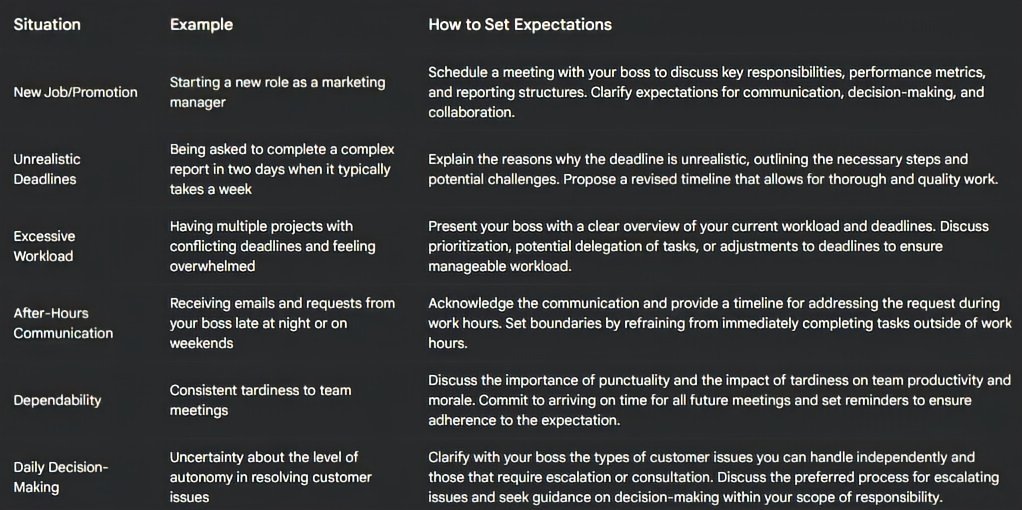Successfully navigating the workplace often involves understanding and managing expectations, not just for yourself but also for your boss. While it may seem counterintuitive, setting your boss’s expectations can be a powerful tool for improving your working relationship, increasing your productivity, and achieving your career goals . This involves proactive communication, clear articulation of your needs and capabilities, and a willingness to engage in constructive dialogue.
Why is Setting Expectations with Your Boss Important?
One of the primary reasons for unhappiness in the workplace is communication issues with one’s manager or supervisor . Often, managers assume employees understand their expectations without explicitly stating them. This can lead to missed deadlines, poor performance reviews, and frustration on both sides. Moreover, a lack of clear expectations can contribute to increased employee turnover. By proactively setting expectations, you can:
- Reduce Misunderstandings: Clearly communicate your understanding of your role, responsibilities, and the desired outcomes for your work.
- Improve Performance: When everyone is on the same page, you can focus your efforts on meeting clearly defined goals and objectives.
- Increase Productivity: Avoid wasted time and effort on tasks that are not aligned with your manager’s priorities.
- Build Trust: Demonstrate accountability and a proactive approach to your work, strengthening your relationship with your boss.
- Minimize Conflict: Address potential issues early on, preventing them from escalating into major problems.
- Enhance Engagement: When you understand how your work contributes to the bigger picture, you are more likely to feel motivated and invested in your job.
- Align Goals: Help your manager understand your career goals and aspirations, allowing them to consider these when assigning tasks and setting expectations.
How to Discuss Expectations with Your Boss
Setting expectations is not a one-time event but an ongoing process. It’s important to remember that both you and your manager should work together to establish clear expectations based on your job description and company priorities . Here are some tips for effectively communicating your expectations to your boss:
- Choose the Right Time and Place: Schedule a formal meeting or a one-on-one conversation where you can have an open and focused discussion.
- Be Prepared: Before the meeting, jot down your thoughts and concerns.
- Clarify your understanding of your job description and key responsibilities.
- Identify any tasks or requests that seem unrealistic or outside your scope of work.
- Outline your current workload and any potential challenges in meeting new demands.
- Consider potential solutions or alternative approaches to address concerns.
- Utilize project management tools and templates to organize your thoughts and track progress.
- Communicate Clearly and Respectfully: Express your needs and concerns in a calm and professional manner.
- Use “I” statements to explain how certain expectations affect you.
- Provide specific examples to illustrate your points.
- Focus on solutions and collaborative problem-solving.
- Active Listening and Mirroring: Pay attention to your boss’s responses and reflect back what you hear to ensure mutual understanding.
- Ask Clarifying Questions: If something is unclear, don’t hesitate to ask for more information or clarification.
- Confirm Expectations: Summarize your understanding of the expectations and get confirmation from your boss to avoid any misunderstandings.
- Document the Outcome: After the meeting, summarize the key takeaways and any agreed-upon actions in writing.
- Set Early Examples: The behavior you exhibit at the beginning of your job or a new project sets the benchmark for future expectations. Establish a positive and sustainable precedent early on by demonstrating your work ethic, communication style, and commitment to meeting expectations.
- Have Crucial Conversations: When starting a new job or taking on a new role, initiate five crucial conversations with your boss:
- Situational Diagnosis: Understand your boss’s perspective on the current business situation and challenges.
- Expectations: Clarify mutual expectations for your role and performance.
- Style: Discuss preferred communication styles and working methods.
- Resources: Negotiate for the resources you need to succeed.
- Personal Development: Explore opportunities for professional growth and development.
Tips for Communicating Effectively with Your Boss
Effective communication is essential for setting and managing expectations. Here are some additional tips to keep in mind:
- Know Your Boss’s Communication Style: Observe their preferred methods (e.g., email, in-person meetings, phone calls) and adapt your approach accordingly.
- Pay attention to their preferred level of detail, frequency of communication, and use of visual aids or data.
- Mimic their communication style to build rapport and improve understanding.
- Be Concise and to the Point: Respect your boss’s time by getting to the point quickly and avoiding unnecessary details.
- Provide Regular Updates: Keep your boss informed about your progress on projects and any potential roadblocks.
- Be Solution-Oriented: When raising concerns, always come prepared with potential solutions or alternative approaches.
- Seek Feedback: Regularly ask for feedback on your performance and how you can improve. This demonstrates your commitment to growth and helps ensure you are meeting expectations.
- Build Rapport: Develop a positive and professional relationship with your boss by being respectful, reliable, and proactive.
- Reframe and Clarify: When your boss gives you instructions or feedback, rephrase it in your own words or ask clarifying questions to ensure you understand their expectations correctly.
- Provide a Purpose: When assigning tasks, connect them to a larger purpose or goal to increase employee motivation and engagement. For example, explain how a specific task contributes to the team’s objectives or the company’s overall success.
- Remember “Common Sense” is Subjective: What seems obvious to one person may not be to another. Avoid making assumptions and communicate clearly and explicitly to ensure everyone is on the same page.
Examples of Setting Expectations in Different Work Situations

Managing Your Boss’s Expectations
While setting your own expectations is crucial, it’s equally important to manage your boss’s expectations effectively. This involves understanding their perspective, priorities, and preferred working style. Remember that managing up often means treating your boss the way they want to be treated, even if it differs from your preferences . Here’s how to effectively manage your boss’s expectations:
- Understand Their Priorities: Learn about your boss’s goals and objectives to align your work with their priorities. This may involve attending team meetings, reviewing company-wide communications, or having direct conversations with your boss about their expectations and priorities.
- Anticipate Their Needs: Proactively identify potential challenges and address them before they become problems. This could involve anticipating roadblocks in a project, identifying potential resource constraints, or proactively seeking clarification on unclear instructions.
- Provide Solutions: When issues arise, offer solutions rather than simply presenting problems. This demonstrates your problem-solving skills and your proactive approach to your work.
- Adding Value: Go above and beyond your assigned tasks to demonstrate your commitment and initiative. This could involve taking on additional responsibilities, offering to help colleagues, or seeking out opportunities to improve processes or contribute to team goals.
- Maintaining Professionalism: Always communicate respectfully and maintain a positive attitude, even in challenging situations. This includes being punctual, meeting deadlines, and responding to communications promptly and professionally.
- Transparency and Accountability: Recognize that your boss also has expectations placed upon them by their superiors and the organization. Understand that they are accountable for the team’s performance and are expected to communicate clearly, engage with the team, provide accurate information, and report timely to upper management.
Dealing with Unrealistic Expectations
Despite your best efforts, there may be times when your boss has unrealistic expectations. In such situations, it’s crucial to:
- Do an Insecurity Check: Before assuming the expectations are unrealistic, evaluate your own skills and confidence. Is it truly an impossible task, or are you feeling insecure or inexperienced?
- Consult Your Colleagues: Talk to your coworkers and see if they have experienced similar challenges or have any advice for managing the situation.
- Don’t Say Yes to Everything: Learn to politely decline requests that are beyond your capacity or outside your job description. Offer alternative solutions or suggest someone else who may be better suited for the task.
- Be Honest with Yourself: Evaluate whether the expectations are truly unrealistic or if there are other factors contributing to your stress. Are you feeling overwhelmed due to personal issues or a lack of work-life balance?
- Put Yourself in Your Manager’s Shoes: Try to understand the reasons behind their expectations. Are they facing pressure from their superiors, dealing with unexpected challenges, or simply unaware of your current workload?
- Ask for Assistance: If possible, seek help from colleagues or other departments to manage the workload. Collaborating with others can help you meet deadlines and achieve goals more effectively.
- Request a Meeting: Have a formal conversation with your boss to discuss your concerns and potential solutions. Come prepared with specific examples and suggestions for addressing the unrealistic expectations.
- Set Boundaries: Clearly communicate your limits and what you are willing to take on. This includes setting boundaries for after-hours communication and ensuring you have adequate time for personal life and well-being.
- Consider Your Options: If the situation doesn’t improve, you may need to re-evaluate your role or consider other career opportunities. Your mental health and well-being are paramount, and no job is worth sacrificing your health or happiness.
Setting and managing your boss’s expectations is a critical skill for navigating the workplace successfully. By proactively communicating your needs, capabilities, and concerns, you can build a stronger working relationship, improve your performance, and achieve your career goals. Remember that this is an ongoing process that requires consistent effort and a willingness to engage in open and constructive dialogue.
Start by understanding your boss’s communication style and priorities. Clearly articulate your own expectations, including your understanding of your role, your current workload, and your career goals. When challenges arise, address them proactively and focus on finding solutions collaboratively. By mastering the art of setting and managing expectations, you can create a more positive and productive work environment for yourself and your boss





